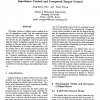215 search results - page 18 / 43 » Feature-based locomotion controllers |
109
Voted
NIPS
2007
15 years 4 months ago
2007
We consider apprenticeship learning—learning from expert demonstrations—in the setting of large, complex domains. Past work in apprenticeship learning requires that the expert...
ICRA
2005
IEEE
15 years 8 months ago
2005
IEEE
— In this paper we present a mathematical model of the TRIKKE, a human-powered scooter produced by Trikke Tech Inc. The Trikke is a three-wheeled, single-rider vehicle that can b...
113
Voted
ICRA
1999
IEEE
15 years 6 months ago
1999
IEEE
This paper proposes a hybrid control method of using the impedance control and the computed-torque control for biped robot locomotion. The computedtorque control is used for suppo...
111
click to vote
ICRA
2005
IEEE
15 years 8 months ago
2005
IEEE
- Polychaete annelid worms provide a biological paradigm of versatile locomotion and effective motion control, adaptable to a large variety of unstructured environmental conditions...
102
Voted
ICRA
1999
IEEE
15 years 6 months ago
1999
IEEE
We analyze a class of mechanisms that locomote by switching between constraints. Because of the hybrid nature of such systems, most of the existing analysis tools, developed prima...

